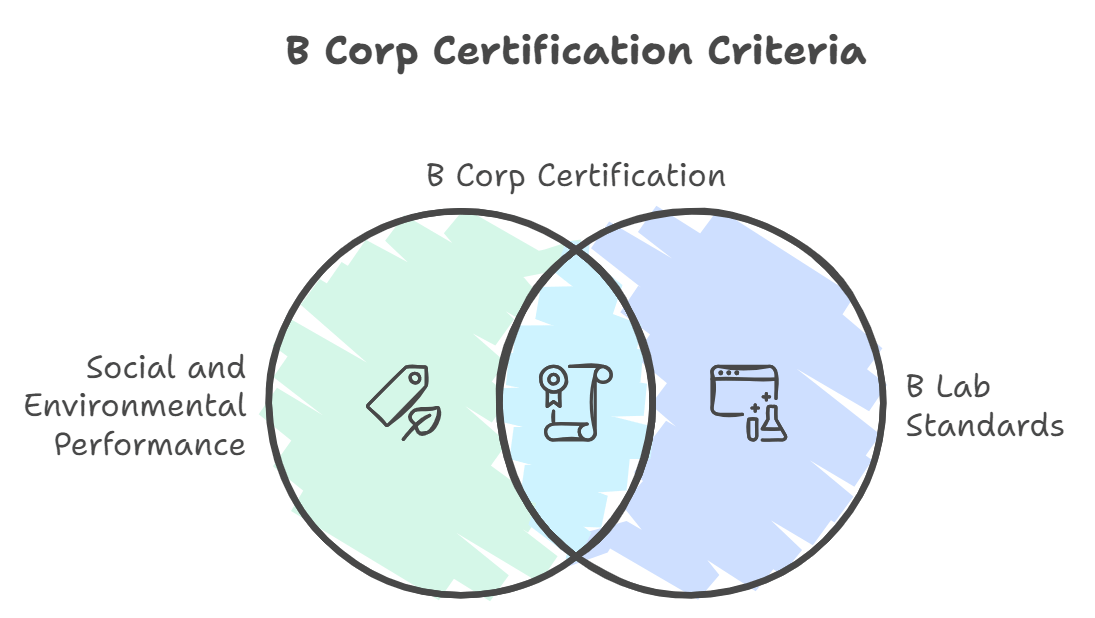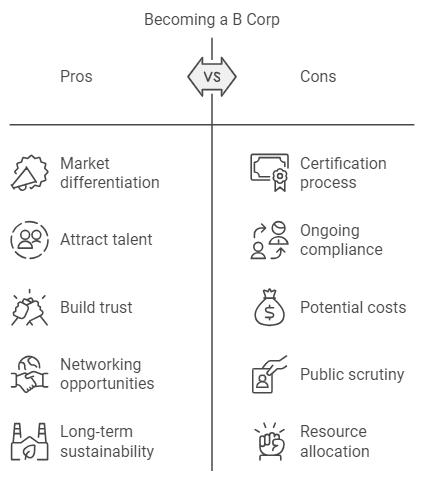Is your company looking for a way to show that it cares about people and the planet? B Corp certification might be the perfect solution. It’s a powerful way for businesses to prove their commitment to social and environmental responsibility while still being profitable. This certification isn’t just for large corporations—it’s for companies of all sizes that want to balance purpose with profit.
But how does B Corp certification work, and why should your company apply? Whether you’re a small business or a growing company, B Corp status can help you align with today’s consumer demand for corporate responsibility and ethical practices. In this guide, we’ll walk you through the certification process and explore why it could be the game-changer your business needs.

1. What is B Corp Certification?
B Corp certification is awarded to businesses that meet rigorous standards of social and environmental performance. To become certified, companies must meet specific criteria across five key areas: governance, workers, community, environment, and customers. These standards are set by B Lab, a non-profit that measures the impact businesses have on the world.
Unlike traditional corporations that focus primarily on profit, B Corps balance purpose and profit. Some well-known B Corps include Patagonia, Ben & Jerry’s, and Etsy, but there are also thousands of smaller businesses making a big impact.
Key benefits of B Corp certification:
- Boosts brand reputation: B Corps are seen as leaders in corporate responsibility.
- Attracts talent: More people want to work for companies that prioritize ethical practices.
- Builds consumer trust: Consumers are increasingly drawn to brands that align with their values.
- Creates a community of like-minded businesses: Being part of the B Corp community connects you with other companies striving for positive change.

2. How Does B Corp Certification Work?
The B Corp certification process may seem daunting, but with the right steps, it’s achievable for businesses of all sizes. Here’s how it works:
Step 1: Complete the B Impact Assessment (BIA)
The first step is taking the B Impact Assessment, a free online tool that measures your company’s impact on its workers, community, environment, and customers. The BIA consists of about 200 questions, with a minimum score of 80 out of 200 required to pass.
Pro tip: Use the assessment to identify areas of improvement, even if you’re not ready to apply. Many companies use it as a tool to guide their sustainability strategies.
Step 2: Meet Legal Accountability Requirements
B Corp certification requires companies to legally embed their commitment to social and environmental responsibility into their governance structure. This typically means amending your company’s articles of incorporation to reflect this broader mission.

Step 3: Submit Documentation and Review
Once you’ve completed the BIA and met legal requirements, you’ll need to provide documentation to support your answers. This is an important part of the process where B Lab verifies your claims. The review process takes between 6 to 10 months, depending on your business size and the complexity of the documentation.
Step 4: Make It Official
Once your review is complete and your score is verified, you will sign the B Corp Declaration of Interdependence, pay the certification fee, and officially become a B Corp!
3. Why Should My Company Apply for B Corp Certification?
Becoming a B Corp is more than just a badge of honor; it can offer real advantages for your business. Here are some reasons why your company should consider applying:
1. Stand Out in the Marketplace
In a crowded marketplace, B Corp certification sets you apart as a company that prioritizes both profit and purpose. Consumers today are increasingly concerned about sustainability, social justice, and transparency. According to a 2022 Nielsen study, 66% of consumers are willing to pay more for sustainable brands. B Corp status signals to customers that your business is committed to these values.
2. Attract and Retain Top Talent
Employees, especially Millennials and Gen Z, are drawn to companies that care about more than just profits. A 2020 Deloitte survey found that 49% of Millennials base their career decisions on their personal ethics. By becoming a B Corp, you demonstrate a commitment to a broader social mission, which can make your company more appealing to top talent.
3. Build Consumer Trust
Earning B Corp certification shows customers that your business is truly committed to doing good. Trust is built through transparency, and B Corps are required to publish their impact reports online, allowing consumers to see exactly how your business is making a difference.
4. Access a Like-Minded Network
When you become a B Corp, you join a global network of 5,000+ businesses that are working towards a shared goal of making the world a better place. This opens doors to partnerships, collaborations, and networking opportunities that can help your company grow.
5. Long-Term Sustainability
B Corp certification is not just about immediate impact; it’s about creating a long-term commitment to sustainability and responsible business practices. This certification helps ensure that your company remains resilient and adaptable in the face of changing market demands and regulations.

4. Key Considerations for Small and Medium-Sized Businesses
If you’re a small or medium-sized business, you might wonder whether the B Corp process is feasible for you. While it does require time and effort, the benefits can be substantial for businesses of all sizes.
Costs of B Corp Certification
One of the common concerns for small businesses is the cost of certification. The fee for B Corp certification is based on your company’s revenue, starting at $1,000 per year for businesses making under $1 million in revenue. While this may seem like a significant investment, the potential return on investment (ROI) through increased customer loyalty and brand reputation can far outweigh the costs.
Time Commitment
Completing the B Impact Assessment and gathering documentation takes time. However, many small businesses report that the process of becoming a B Corp helped them identify new ways to improve efficiency, reduce waste, and build a stronger company culture.
Tip: Start by completing the BIA, which is free, to get a sense of where your business stands. Even if you don’t apply right away, the insights you gain can help you make more informed decisions.

Impact on Business Operations
For small businesses, the changes required to become a B Corp might feel challenging, but they’re achievable. You’ll need to focus on improving your environmental footprint, ensuring fair treatment of employees, and contributing to your community.
Success story: Greyston Bakery, a small business with fewer than 100 employees, became a B Corp by focusing on their open hiring policy, which provides job opportunities for people who often face barriers to employment. They’re now a leader in social enterprise and have seen increased business growth since certification.
Bonus: B Corp Certification Key Questions
What Are the 5 Pillars of B Corp?
The B Corp assessment is based on five main pillars:

- Governance: How your company is structured and managed.
- Workers: Your company’s practices toward employee well-being.
- Community: Your impact on the local and global community.
- Environment: Your environmental footprint and sustainability efforts.
- Customers: How your products or services benefit customers and society.
Each pillar is important, and companies must excel across the board to earn certification.
What Is the Disadvantage of B Corp Certification?
While there are many advantages to becoming a B Corp, there are some challenges too. The certification process can be time-consuming and expensive, especially for smaller companies. Maintaining certification also requires ongoing effort, including re-certification every three years. Additionally, companies may face criticism or skepticism, with some questioning whether they truly meet the standards or are using the certification for marketing purposes. Another concern is that, despite the growing consumer interest, B Corp status may not yet be widely recognized by the general public.
What Is the Success Rate of B Corp applications?
Globally, over 6,000 companies have earned B Corp certification, a number that is steadily growing. However, not all companies that start the certification process complete it. Only about 40 percent of applications are successful, according to B Lab.
Are B Corps more resilient?
Initial evidence does point to B Corps being more resilient. An internal study published by B Lab in 2023 compared the resilience of B Corps to traditional companies, during the pandemic. The B Lab team found that 95.6% of B Corps were still active as of September 2023, compared to 87.8% of ordinary businesses.
How Many B Corp Companies Are There in the USA and Canada?
As of now, the USA and Canada has over 2000 certified B Corps, including both small businesses and large corporations. These companies represent a wide range of industries, from food and beverage to fashion and technology.
Can You Lose B Corp Status?
Yes, companies can lose their B Corp certification if they fail to maintain the standards required. Certification must be renewed every three years, and if a company’s B Impact Assessment score drops below 80 points or it is found to be violating any ethical or environmental standards, certification can be revoked. In fact, a few companies have lost their B Corp status for failing to uphold these rigorous standards.
Who Owns B Corp Certification?
B Corp certification is managed by B Lab, a nonprofit organization that developed the assessment and oversees the certification process. B Lab’s goal is to encourage businesses to act as a force for good, balancing profit and purpose.
Conclusion
B Corp certification offers a powerful way for companies to demonstrate their commitment to positive social and environmental impact. The certification process, while thorough, can be a transformative journey for businesses of all sizes. It not only enhances brand reputation but also strengthens your company’s long-term sustainability.
If you’re a business owner considering B Corp certification, now is the time to take that first step. Complete the B Impact Assessment, reflect on your company’s practices, and see how B Corp certification could elevate your brand, attract top talent, and build customer trust. Don’t wait to make a difference—start your journey towards B Corp certification today.
Pingback: How Mondetta is Leading the Way in Sustainable Fashion (While Others Just Talk About It) - Ecological Crusader
Comments are closed.